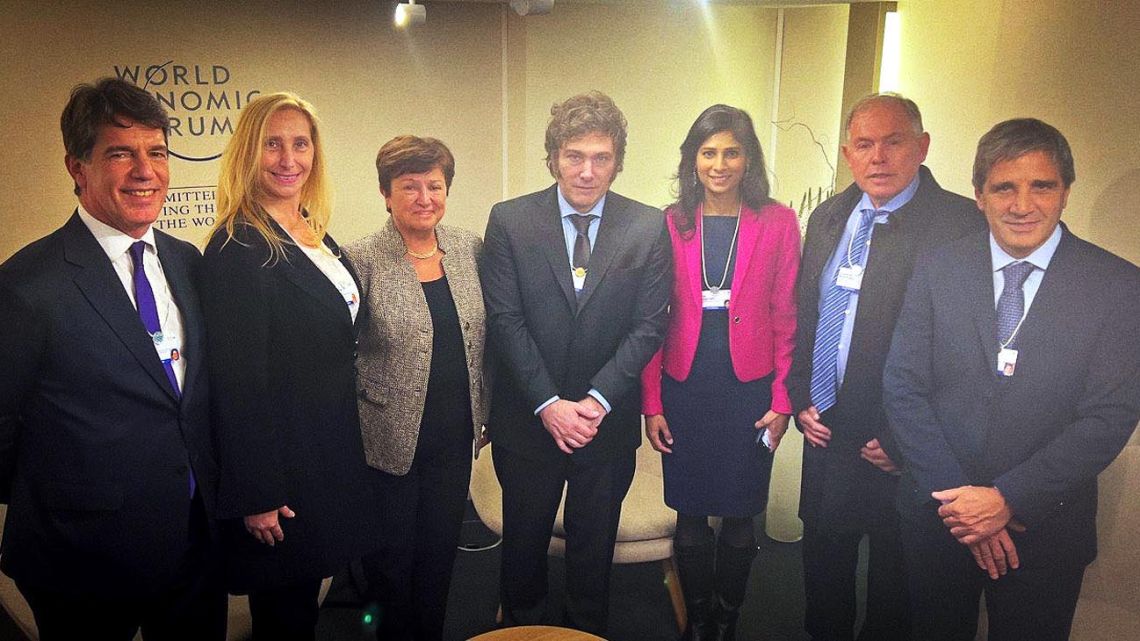In seeking to reduce the fiscal deficit in 2024, the government of Javier Miley committed to him International Monetary Fund (IMF) to reduce the energy subsidies at 0.5% of the Gross Domestic Product (GDP) and apply increases of 200% in electricity rates and 150% in gas rates since February.
This is clear from the report of the seventh review of the Extended Facilities Agreement that Argentina signed with the IMF for the payment of the USD 44,000 million loan that the Mauricio Macri administration took in 2018.
Javier Milei met with businessman Larry Fink, owner of the largest investment fund in the world
Energy rates: differences between the Government and the IMF
Despite the guidelines issued by the Fund, the Ministry of Economy postponed the updates of the gas rate tables until March after officiating the first public hearing on January 8. Instead, the Ministry of Energy seeks to accelerate the implementation of adjustments to electricity bills. The thing is electricity explains 70% of subsidies state to energy.
Regarding the budget pruning, the multilateral organization maintained that the ruling party will consolidate the path towards balancing public accounts through a spending adjustment of 3% of GDP based on the reduction of “inefficient energy subsidies”with increases in rates electricity (more than 200%) y gas (more than 150%) starting in February, after public hearings where authorities are expected to describe their plans to move to recovery costs,” among other items.
In this way, the audit body determined that after an initial increase in the current month, “gas and electricity prices will rise quickly to achieve cost recovery by April 2024, except for the most vulnerable households, in line with the scheduled reduction of energy subsidies by 0.5% of GDP this year“.
In this sense, the ruling team presented to the financial entity the initial details of a new subsidy scheme, aimed at “improving the targeting of subsidies for vulnerable households (based on basic energy consumption depending on the size and location of the home). ) which will come into force in April 2024”.
“Efforts are also being made, with the support of the Fund and the World Bank, to replace the current tariff segmentation scheme for one that better orients subsidies towards the basic basket of energy consumption for vulnerable sectors, in line with broader energy and climate efficiency objectives, the details of which will be published in April,” the text states.
The energy debts that Milei inherited
On the other hand, the lender of last resort reported a series of debts bequeathed by the government of Alberto Fernández that affect Argentina’s energy and exchange rate policy: US$196 million with the oil company ExxonMobil; US$200 million with Bolivia and US$100 million with Paraguay.
Regarding the amount owed to the Bolivian nation, it is related to “non-payment of overdue invoices and interest in 2023” for gas imports and the new authorities resumed payments while developing a plan to meet commitments before August 204.
“Similarly, the new Argentine government and the new Paraguayan authorities have deepened discussions on the payment agreement for expired obligations owed to the Paraguayan and Argentine binational entity Yacyretá related to energy imports in 2023“, details the writing.
For the Government, January inflation at levels of 20% is “a good indicator”
Where will the Government’s adjustment go, according to the IMF
Beyond the cuts in the energy area, the IMF identified four other edges of the fiscal chainsaw which aims to achieve zero deficit in December 2024. This is an objective that looks at least challenging after the total red of 6.1% of GDP which showed 2023 and the fall of the fiscal chapter of the Omnibus law that included extra income for 1.8% of the product.
First of all, the Treasury Palace agreed with the supervisory institution “certain compression of government operating costs from a reorganization of the national administration” that will consist of a reduction in ministerial allocations.
At the same time, the Government promised a reduction “in the public sector wage bill through the release of contracted workers in 2023 and efforts to contain wage adjustments (including to avoid excessive price and wage dynamics).”
Third, the common roadmap includes a strict capital expenditure prioritization, focusing on the construction of critical pipelines and railways, almost completed projects and a pause in new public tenders. Specific, restrict public works to the essential minimum.
Finally, the program drawn up by the ruling party includes cuts in discretionary transfers to provinceswhich “would continue to have the capacity to internally finance other projects and essential maintenance needs, and state-owned companies to initiate reforms and prepare for possible privatization.”
“Recognizing the uncertainties around revenue results and temporary nature of trade-related taxesauthorities are reviewing additional high-quality measures to be implemented during the second half of 2024, including improving tax compliance, strengthening excise taxes (the Omnibus Law contemplates a reform of excise taxes on tobacco) and rationalizing tax expenditures (for example, harmonizing VAT rates on all goods)”, concludes the IMF report.
MFN
